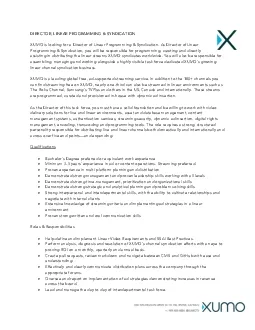PPT-Chapter 4 Linear Programming Applications
Author : tatiana-dople | Published Date : 2019-12-16
Chapter 4 Linear Programming Applications in Marketing Finance and Operations Marketing Applications Media selection Financial Applications Portfolio selection Operations
Presentation Embed Code
Download Presentation
Download Presentation The PPT/PDF document "Chapter 4 Linear Programming Applicati..." is the property of its rightful owner. Permission is granted to download and print the materials on this website for personal, non-commercial use only, and to display it on your personal computer provided you do not modify the materials and that you retain all copyright notices contained in the materials. By downloading content from our website, you accept the terms of this agreement.
Chapter 4 Linear Programming Applications: Transcript
Download Rules Of Document
"Chapter 4 Linear Programming Applications"The content belongs to its owner. You may download and print it for personal use, without modification, and keep all copyright notices. By downloading, you agree to these terms.
Related Documents










![[FREE]-c programming textbook.c programming book.c programming language.c programming.c](https://thumbs.docslides.com/979920/free-c-programming-textbook-c-programming-book-c-programming-language-c-programming-c-programming-visual-quickstart-guide-c-programming-for-dummies-absolute-beginner-s-beginner-exercises-in-easy-steps.jpg)
![[PDF]-Programming 3: Python Programming Professional Made Easy & C Programming Success](https://thumbs.docslides.com/980147/pdf-programming-3-python-programming-professional-made-easy-c-programming-success-in-a-day-c-programming-c-programming-c-programming-language-html-python-programming-python-java-php.jpg)